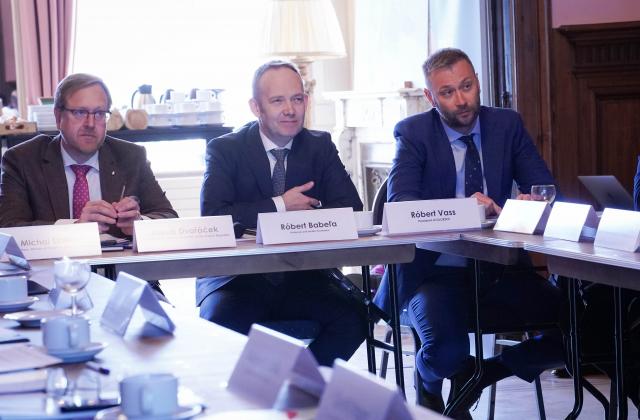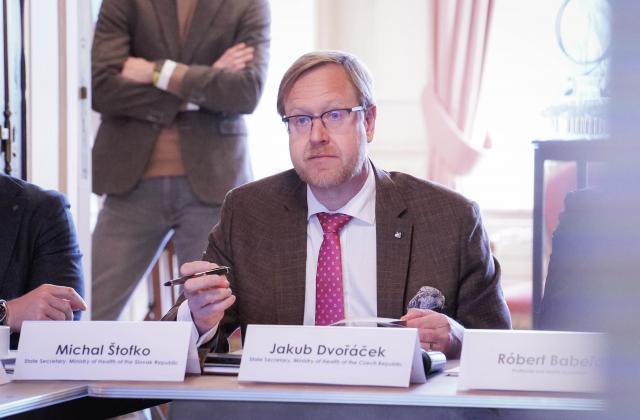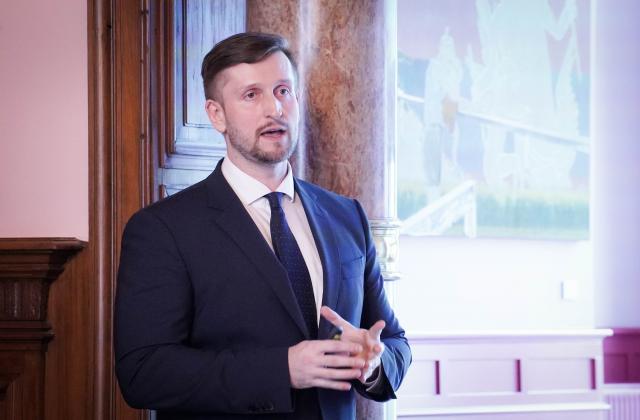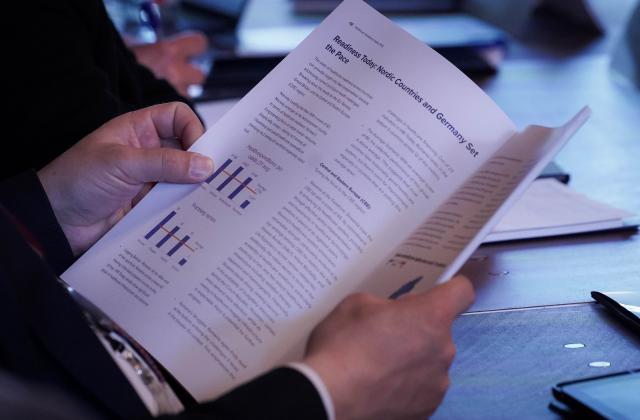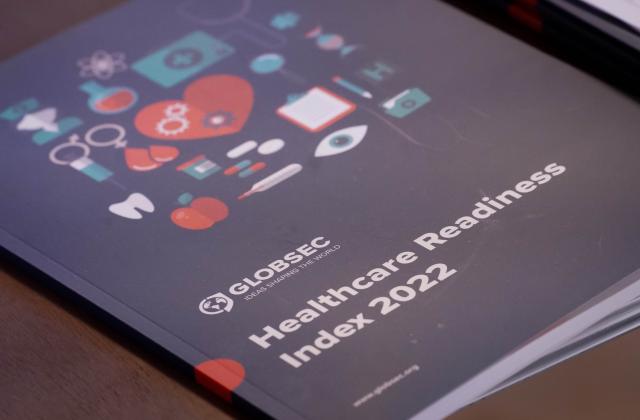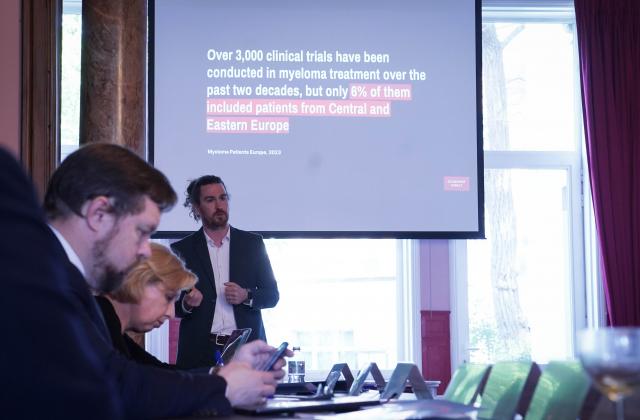GLOBSEC Closed-Door Roundtable Meeting Explores Future of Healthcare in CEE
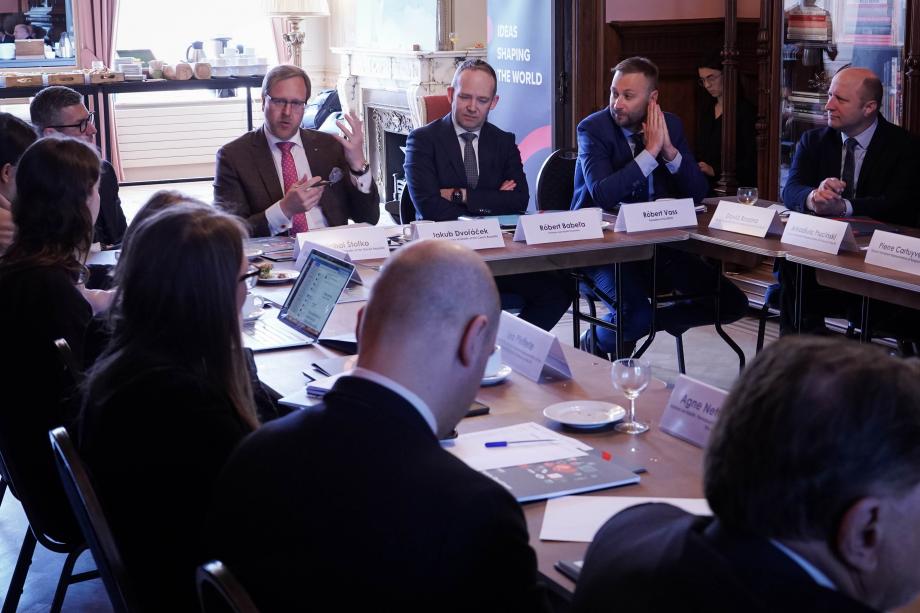
Brussels, 24 April 2024. On the sidelines of the informal meeting of health ministers in Brussels, a closed-door roundtable discussion organized by GLOBSEC under the auspices of the Ministry of Health of the Czech Republic convened key stakeholders to debate the Future of Healthcare in Central and Eastern Europe (CEE). Among the attendees were health ministers of Romania and Estonia, along with state secretaries from the Czech Republic and Slovakia and permanent representatives from Lithuania, Slovenia, Latvia, Poland and other EU countries.
The meeting featured the presentation of two significant healthcare reports: the GLOBSEC Healthcare Readiness Index (HRI), assessing the readiness of EU countries to confront present and future healthcare challenges, and data from an upcoming case study by The Economist Impact, focusing on the clinical and economic implications of gaps in care and treatment availability for multiple myeloma in CEE.
Research conducted by GLOBSEC in the previous year, published in the HRI report, revealed alarming statistics, indicating that 10 CEE nations accounted for 65% of excess deaths per capita within the EU since the onset of the pandemic in 2020. Furthermore, out of the 10 countries ranking lowest in the EU's healthcare performance during the pandemic, 8 were from the CEE region, with Italy and Greece also experiencing significant challenges.
Recognizing the need for a comprehensive assessment beyond the CEE countries, the HRI update extended its scope to include all EU nations, as well as Great Britain and Norway. This expanded perspective aims to provide valuable insights into healthcare infrastructure, management strategies, and resilience across diverse European landscapes.
These insights also served as a starting point for the roundtable debates. Discussion further centered on the European Union's Beating Cancer Plan and its implementation, with a particular focus on the economic implications of oncology diagnoses. Attendees underscored the importance of assessing the readiness of EU healthcare systems to face these challenges, reaffirming a commitment to collaborative, innovative, and informed policymaking.
In particular, attention was drawn to multiple myeloma, once deemed swiftly fatal but now manageable for many due to treatment advancements and comprehensive care. However, despite global progress, a significant care gap persists in the CE&B (Central and Eastern Europe and Baltics) region, where mortality rates surged by 32% from 1990 to 2019.
Martin Smatana, GLOBSEC Fellow and author of the GLOBSEC Healthcare Readiness Index 2023, highlighted systemic issues hindering optimal cancer care in the region, including decreased healthcare investments, delayed adoption of diagnostic advancements, and limited access to standard care treatments. “Effective collaboration among policymakers, healthcare professionals, patients, and pharmaceutical companies is essential to delivering optimal care in the region. By aligning efforts and resources, we can overcome the systemic barriers that hinder progress and ensure that all patients receive the care and support they need to thrive,” he emphasized.
In response, a set of recommendations aimed at improving myeloma outcomes in the CE&B region had been identified:
- Enhance Healthcare Investment: Increased investment in healthcare infrastructure is crucial for bolstering patient outcomes.
- Increase Access to Innovative Treatments: Revising evaluation criteria to prioritize the value of innovation can facilitate greater access to cutting-edge therapies.
- Develop Comprehensive Care Infrastructure: Establishing robust infrastructure that supports multidisciplinary care and comprehensive data collection is imperative for optimizing patient care and resource allocation.
"Investing in healthcare is not just a fiscal decision; it's an investment in the vitality and productivity of our people. By prioritizing healthcare as a strategic pillar, governments can cultivate a healthier, more resilient workforce, ultimately enhancing our country's competitiveness on the global stage," prof. Róbert Babeľa, Health Economist and former State Secretary at Ministry of Health of the Slovak Republic, one of the moderators of the discussion, concluded.
